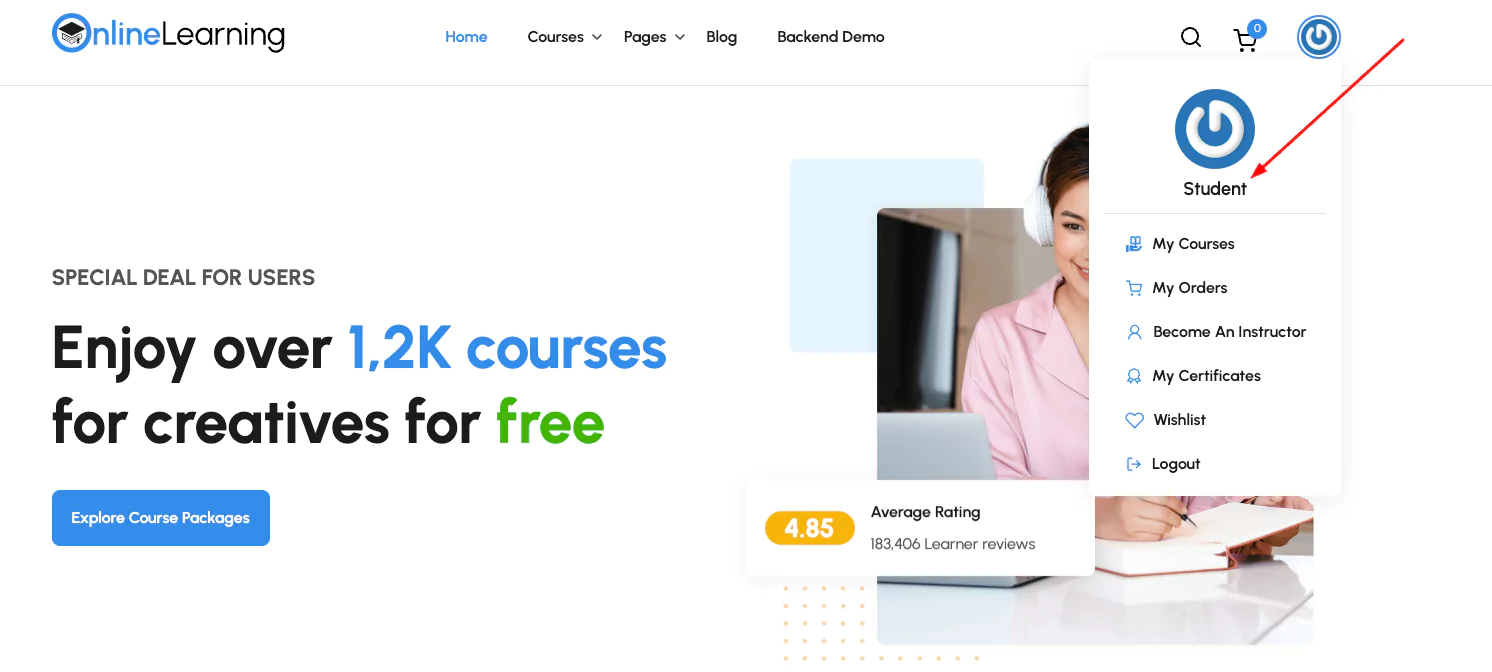Online learning offers flexibility and convenience, but it also requires a proactive approach to ensure a successful learning experience.
One crucial aspect of this is effective collaboration with your instructors.
Building a strong and positive working relationship with your instructors can significantly enhance your understanding of the course material, improve your performance, and contribute to a more fulfilling online learning journey.
This blog post outlines various strategies for collaborating with instructors in online courses. Hence, you can maximize your learning potential and make the most of your online education.
Let’s get started!
Eduma – Education WordPress Theme
We provide an amazing WordPress theme with fast and responsive designs. Let’s find out!
1. Develop Clear Communication Channels

Any successful collaboration depends heavily on effective communication. Clear communication lines with your instructor are essential in online courses.
Use the available communication tools, such as emails, discussion boards, or virtual office hours, to clarify doubts, seek feedback, and stay updated on course-related announcements.
Regular communication helps to build rapport with your instructor and ensures that you receive timely support.
- Emails: Emails are a suitable option for private and detailed inquiries. When composing emails, maintain a professional tone, clearly state your questions or concerns, and proofread your message before sending it.
- Discussion Boards: Course-specific discussion boards provide a platform for public interaction. Participate actively in discussions, ask thoughtful questions, and respond to your instructor’s prompts and classmates’ posts. This demonstrates your engagement and allows for collaborative learning.
- Virtual Office Hours: Many instructors offer virtual office hours, providing dedicated time for students to interact directly. Take advantage of these sessions to ask questions, discuss assignments, or seek clarification on course material.
2. Set Measurable Learning Objectives

Before commencing an online course, take the time to define your learning objectives.
What do you hope to achieve by the end of the course?
Setting clear and measurable goals helps you stay focused and motivated throughout your learning journey.
Share these objectives with your instructor, allowing them to understand your expectations and tailor their guidance accordingly.
- Align with Course Outcomes: Ensure that your learning objectives align with the overall course outcomes. This helps you prioritize your efforts and ensures that you are on the same page as your instructor.
- Break Down Goals: Break down your overarching learning objectives into smaller, more manageable goals. This makes it easier to track your progress and stay on track.
- Communicate with Your Instructor: Discuss your learning objectives with your instructor early in the course. This allows them to provide feedback, suggest relevant resources, and offer support in achieving your goals.
3. Participate Actively in Discussions

Active participation in online discussions is crucial for collaborative learning and demonstrating your engagement to your instructor.
Contribute meaningfully to discussions by asking questions, sharing insights, and responding to your classmates’ posts.
- Be Prepared: Before participating in discussions, review the assigned readings or materials. This ensures that you are well-informed and can contribute meaningfully to the conversation.
- Ask Thought-Provoking Questions: Don’t hesitate to ask questions that stimulate further discussion and deepen your understanding of the topic.
- Provide Constructive Feedback: Offer constructive feedback on your classmates’ posts, fostering a supportive and collaborative learning environment.
- Respect Diverse Perspectives: Online discussions often involve students from diverse backgrounds and with varying viewpoints. Be respectful of different perspectives and engage in respectful dialogue.
4. Follow Netiquette Guidelines

Netiquette refers to the etiquette of online communication.
In online courses, it is essential to maintain professionalism and respect in all interactions.
- Use Professional Language: Avoid using slang, jargon, or informal language in your communications with instructors and classmates.
- Be Concise and Clear: Keep your messages concise and to the point, ensuring that your communication is clear and easy to understand.
- Proofread Before Sending: Always proofread your messages before sending them to avoid grammatical errors or typos that could detract from your message.
- Respectful Tone: Maintain a respectful tone, even when disagreeing with someone else’s viewpoint. Focus on constructive criticism and avoid personal attacks.
5. Seek Feedback and Use It Constructively

Feedback is an invaluable tool for growth and improvement.
Regularly seek feedback from your instructor on your assignments, participation, and overall performance in the course.
Use this feedback constructively to identify areas for improvement and enhance your understanding of the course material.
- Ask Specific Questions: When seeking feedback, ask specific questions about areas where you are unsure or would like further guidance.
- Be Open to Feedback: Be receptive to feedback, even if it is critical. View it as an opportunity for growth and improvement.
- Apply Feedback: Implement the feedback you receive in your subsequent assignments and participation. This demonstrates your commitment to learning and your willingness to improve.
6. Use Collaborative Tools

Online courses often utilize collaborative tools to facilitate group projects, discussions, and knowledge sharing.
Familiarize yourself with these tools and actively participate in collaborative activities.
- Shared Documents: Utilize shared document platforms, such as Google Docs or Microsoft Office Online, to collaborate on group projects, share notes, and provide feedback.
- Forums: Participate in online forums to engage in discussions, ask questions, and share resources with your classmates.
- Virtual Meeting Platforms: Utilize virtual meeting platforms, such as Zoom or Google Meet, for group projects, virtual study sessions, or online office hours.
7. Be Proactive and Organized

Online learning requires a high degree of self-discipline and organization.
Proactive students who plan their study schedule, keep track of deadlines, and stay organized tend to collaborate more effectively with instructors and peers.
- Create a Study Schedule: Develop a study schedule that allocates dedicated time for completing assignments, participating in discussions, and reviewing course material.
- Use a Calendar: Utilize a calendar or task management tool to keep track of deadlines, assignments, and virtual meetings.
- Stay Organized: Maintain a well-organized digital workspace to store course materials, assignments, and notes.
8. Engage in Real-World Collaborative Experiences

Whenever possible, apply the knowledge and skills you acquire in your online course to real-world scenarios.
This can make your learning more relevant and engaging.
- Case Studies: Participate in case study discussions or projects that simulate real-world situations.
- Simulations: Engage in online simulations that allow you to apply your knowledge in a virtual environment.
- Group Projects: Collaborate with classmates on group projects that address real-world problems or challenges.
Use LearnPress to Collaborate with Instructors on Online Courses
LearnPress, a powerful Learning Management System (LMS) plugin for WordPress, is aimed at facilitating the organization of online courses for both students and teachers.

It allows clear communication and learning interaction, which leads to the overall active participation of the users promoting the constructive edifice that is e-learning thanks to the available add-ons and resources of LearnPress.
One of the main advantages of LearnPress is its compatibility with discussion forums like bbPress. Such forums are useful in that they provide room for students and teachers to meet and exchange questions, answers, and their overall comments.
As for LearnPress, it also has tools for sending messages which enhances the communication between students and instructors without the need of making it public.
In LearnPress, quizzes and assignments serve a purpose beyond mere evaluation; they promote interaction as well. Students may send their work for evaluation and get their instructors’ feedback on them. Explanations for answers are also provided in most quizzes which help learners grasp the concept even better.
Moreover, through integrations with online meeting tools such as Zoom and Google Meet, LearnPress focuses on interaction as well, as students attend virtual office hours, live Q&A sessions, and group discussions.
For active learners who dislike being tied down to one physical location, there is the LearnPress Mobile application. Students can view course content, engage in discussions, and even reach out to their teachers regardless of their location. Thanks to instant notifications, no learner has to worry about missing any crucial messages or even feedback simplifying interaction even further.
In order to access all of the above features of LearnPress, one can purchase Eduma, a WordPress theme for education which we build and provide. Eduma includes 21 premium LearnPress Add-ons making it easy to design and maintain a course selling website.
Final Thoughts
Collaborating with instructors in online courses is essential for academic success and a fulfilling learning experience.
Hopefully, you can establish a strong working relationship with your instructors, actively participate in the learning process, and achieve your learning objectives.
Remember to communicate clearly, participate actively, seek feedback, and utilize collaborative tools to maximize your online learning experience.
Contact US | ThimPress:
Website: https://thimpress.com/
Fanpage: https://www.facebook.com/ThimPress
YouTube: https://www.youtube.com/c/ThimPressDesign
Twitter (X): https://twitter.com/thimpress


